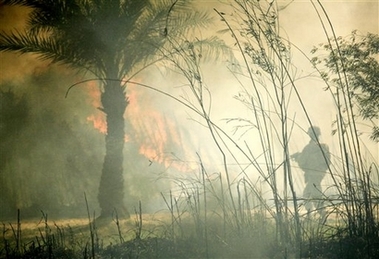Middle East
Military announces 8 US deaths in Iraq
(AP)
Updated: 2007-05-27 11:09
 |
Large Medium Small |
One of those killed, a Marine, died in combat in Anbar province, once the site of some of the fiercest fighting in the country -- and where the US ambassador, the American commander in Iraq, and the Iraqi leader traveled Saturday.
The Sunni-dominated province has grown calmer in recent months with the flowering of a new alliance among Sunni tribal leaders, the Iraqi government and US led forces, but peace continues to be elusive -- as the death Saturday of the Marine demonstrated.
"We are not saying Anbar province is all sweetness and light, there are still a lot of challenges," said Gen. David Petraeus, the US commander.
Elsewhere on Saturday, three US soldiers were killed in Salahuddin Province, north of Baghdad, when an explosion hit their patrol; another died in a roadside bombing in south Baghdad.
Late Friday, a soldier was killed in an ambush near Taji, north of the capital, and two other soldiers were hit by a roadside bomb on Wednesday in eastern Baghdad, the military said.
Al-Qaida in Iraq is still active in Anbar -- which includes the cities of Fallujah and Ramadi -- and continues to launch devastating attacks, US military officials said. On Thursday, insurgents exploded a car bomb on a passing funeral procession in Fallujah for a tribal leader opposed to al-Qaida. At least 26 mourners were killed.
Despite the security accomplishments, an al-Qaida front group affiliated with insurgent Sunnis warned President Bush on Saturday that the newly approved $95 billion in funds for fighting in Iraq and Afghanistan would not improve Washington's chances for success.
"With God's help, the money will heal no wound and change nothing at all," said a statement issued by the Islamic State of Iraq and posted on a Web site commonly used by Islamic extremists. The statement's authenticity could not be verified.
As part of the US-led security crackdown in Baghdad, American forces raided the Shiite neighborhood of Sadr City early Saturday and captured a "suspected terrorist cell leader," who helped smuggle powerful, armor-piercing bombs from Iran, the US military said in statement.
After the raid, around 2 a.m., US and Iraqi forces called in air strikes on nine cars positioning themselves to attack American forces, killing five suspected militants, the military said.
An Iraqi police official said the strikes hit 10 cars in line to buy gasoline, killing three civilians and wounding eight others. The official spoke on condition of anonymity because he was not allowed to release the information.
Iraqi Prime Minister Nouri al-Maliki, US Ambassador Ryan Crocker and Petraeus had planned to travel Saturday to al-Qaim, an Anbar town on the Syrian border, to meet with tribal leaders and survey a $20 million border terminal under construction.
But low visibility prevented their aircraft from completing the trip, and they could only reach the al-Asad air base in Anbar.
So, with temperatures soaring above 100 degrees, al-Maliki and several of his Cabinet ministers met with the Anbar governor and police and army chiefs. Crocker and Petraeus, meanwhile, were briefed by local US commanders.
Just a few months ago, Anbar was thought to be so strongly in the grip of al-Qaida foreign fighters and Sunni insurgents that it was believed a lost cause, the military officials said.
But al-Qaida went too far, killing several tribal leaders, and terrorizing the local population, said Maj. Gen. Walter Gaskin, commander of US-led forces in Anbar.
"All Iraqis live in violence," he said. "They are sick of it, and al-Qaida overplayed its hand in the murder and intimidation campaign."
The fed-up tribal leaders banded together against al-Qaida several months ago and began working with US and Iraqi forces, he said.
"They didn't just fall in love with coalition forces. We had a mutual interest: security," Gaskin said.
Since then, the changes in some parts of the province have been dramatic, he said.
During a recruitment campaign for the Iraqi military and police last summer, only 34 people signed up. Since then, more than 14,000 have joined, Gaskin said.
The increase in Iraqi forces, with their knowledge of the local terrain, helped US and Iraqi troops push most of the insurgents out of the city of Ramadi, or at least drove them underground, he said. A similar operation in Hit reduced violence so much that Petraeus said he was able to walk down the street there recently, eating an ice cream, without fear of attack.
With the help of the local population, the military has uncovered more weapons caches in Anbar in the first five months of this year, than in all of last year, Petraeus said.
"When we came in here, we didn't get it right with the tribes," Crocker said. "It was just too complicated to figure out at the time, and we ran into a lot of problems. Al-Qaida got it even more wrong."
Crocker said he hoped planned provincial elections -- which cannot be held until parliament agrees on a new election law -- will cement the tribes' participation in government and their loyalty to the new Iraqi regime.
Petraeus warned that the situation in Anbar may not be a realistic blueprint for restoring order in the rest of the country, because the province is heavily Sunni and has been spared much of the sectarian violence roiling other areas.
"The biggest lesson learned in Iraq is that every place is unique," he said.
| 分享按钮 |

